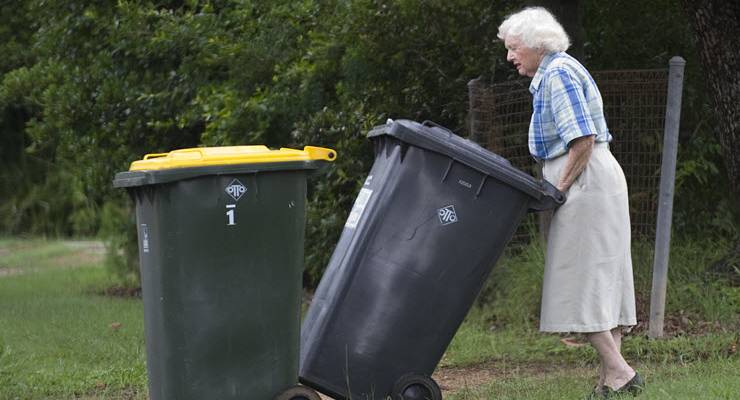
It started as a Facebook gripe from a woman in suburban Brisbane about someone trawling through her council bin.
“Is it just me or is anyone else bothered that people roam the streets and bin dive into people’s recycling bins to get cans and bottles? I just had an altercation with someone going through my bin and I don’t appreciate it at all.”
It escalated quickly. “Wow, it’s not like they’re breaking into our houses to steal our possessions,” one neighbour commented. “I don’t mind as long as the scavengers put the bloody bin back where they got it,” someone else added.
“It’s shit,” said another. “I was so shocked when it happened. I thought it must have been possums or something throwing shit around from the bin — but nope, was someone going up the street and rummaging through my empty wine bottles.”
And then this: “We do this as a single mum … low life abusive ex gave up his six figure job to avoid child support. I’m left with $6/wk to fee me and the kids after rent and bills so this helps our family while walking our dog.”
One small neighbourhood and a glaring illustration of both the rise of suspicion and the loss of trust as we navigate a future no-one saw coming.
On a bigger scale, that’s exactly the risk in the bamboozlement of numbers, without faces, being delivered by our political leaders about COVID-19 each day.
In Victoria today, we have 70 new cases and sadly, five deaths. In NSW, a new cluster of 13 is causing concern. Hooray for Queensland, where yesterday there was only one case — but wear a mask anyway.
In those messages, dominated by numbers and dutifully delivered, humanity is absent, and it’s easy to miss the suspicion and lack of trust that risks causing as many problems as the pandemic.
Each number is someone struggling to breathe. Each death is a funeral, where at least one loved one is physically unable to say goodbye. In aged care homes, people are dying without being wrapped in the love of someone who cares.
In our healthy obsession with sport and stolen football finals, state borders have become harder to penetrate than national ones, and this alone will drive discussion for years.
People are unable to get the cancer treatment they need because of a closed state border. Parents are unable to see their children for months in boarding school, because they are not permitted to border hop. State premiers are up against each other; not over funds from Canberra, but a determination to keep “their patch” COVID-free.
In Queensland, we’ve become as suspicious of vehicles bearing Victorian number plates as some are of people diving into their recycling bins.
We need to know the numbers each day, but we need to understand that they don’t tell the stories that continue to unfold as our homes and hotels become prisons. Those interpersonal skills, where we look out for our neighbours, and teach our children how to develop friendships, have never been more in need.
It’s not just here. The Economist pointed out this week that in Ecuador, people are still searching for the bodies of relatives who died four months ago; in Italy, a boy begged a priest to forgive the “sin’’ of lowering his face mask outdoors. In Zimbabwe, grandparents are being taught how to provide “talk therapy” on village benches to those who cannot afford to visit clinics. Meanwhile, in Brisbane, the wait to see a psychologist is now, routinely, six months.
So what will our lives look like in a decade? That narrative is still being written, but surely it needs to be as big a focus for our policymakers as the day-to-day running COVID tallies.
On that same suburban Facebook page, under another chat, a book-lover tells the story of the Human Library and asks whether that is what we need here.
Started in Denmark 20 years ago, it now graces more than 50 countries. Instead of books, people are able to “borrow” other people. Each human “book” represents a group in the community who have been subject to discrimination or prejudice because of disability or ethnicity or belief or diagnosis or lifestyle.
Sitting across from each other — or perhaps even on Zoom — the human book tells its story, answers questions and shares thoughts. Connecting people, reducing suspicions and building trust.
It’s just one idea. We need more, just as much as we need the vaccine we’re all chasing.
How have you been connecting with people during the pandemic? Let us know by writing to letters@crikey.com.au. Please include your full name to be considered for publication in Crikey’s Your Say section.








“… not over funds from Canberra,..”
STOP IT AT ONCE!
If you are referring to the federal government please use that term. Canberra is the name of the nation’s capital and, speaking as a Canberran, I have no knowledge of the ACT intending to send any funds to any other territory or state.
Agree – lazy writing.
If the bin is on the street it is fair game for everyone. If you put out a bin that contains redeemable bottles and cans, WHAT SORT OF MONSTER ARE YOU? If you do that AND complain that other people get those bottles, you’d better avoid walls when the revolution comes.
Bunnings Karen, maybe?
Musings of the Plastic Bag-Lady?
…. There’s a Labor government in Queensland….
The “closeness to Brisbane hospitals” argument? Does that mean that people in Albury/Broken Hill should be going to hospitals/treatment in Melbourne?
Back in the day, King never rose above anything more than a subjective conservative stooge hack, using her position as a Saturday columnist – under husband and editor Dave Fagan of Murdoch’s Brisbane Curry or Maul – to do her best to dissuade impressionable rubes from the folly of voting for Labor or the Greens, by confecting the progressive’s inappropriateness to govern.
Again, one week, when Rudd’s Environment Minister Peter Garrett floated the idea that plastic bags should be done away with, she came out that Saturday with a piece outlining humanity’s reliance on them, in defence of their continued indefinite use.
I remember how, a few years back, when police issued identikit pictures, of a couple of perps, then circulated (papers and TV) she remarked (ABC radio) on how “accurate” they were : when the offenders hadn’t been apprehended, so that comparisons of accuracy couldn’t have been made.
Detailed yes. “Accurate”? Who knew, beyond her?
One wonders on what world Madonna King has being living on for the past 30 years. All this talk about ‘connecting with people’ and trust and helping each other. REALLY??? Please give me a break!!! The sooner King returns from Bizarro world to Earth the better. You know Bizarro world features in Superman comics it’s a place where everything is the opposite from what it is on Earth.
I don’t really see what the problem is. Australia has been on this morally bankrupt route that King so vociferously decries for years. In fact if the previous respondents to this article are correct it’s a road that King and her kind thrive and live on, let us call this mythical road ‘Capitalist – neoliberal’ Drive. All the people on ‘Capitalist – neoliberal’ Drive share a common life style and set of values that they have successfully indoctrinated the rest of the population to adopt. In fact, I have rarely seen a people so readily incorporate the economic neo-liberal values of individualism, competition,dog eat dog and lack of empathy for others as their moral code to live by.
What we now have is the total victory of economic values from those living on ‘Capitalist – neoliberal’ Drive over our previously community oriented moral values. We have made the successful transition from a caring community keen to look after each other’s interests to our aspirational – ‘what’s in it for me’? state of living. If any final proof of this is needed one need look no further than the electoral victory of ‘the fool in the baseball cap’ as he preached a message of fear (lies), division, racism and with nothing to offer so many Australians who through little fault of their own were doing it tough such as the bludgers on Newstart, the evil asylum seekers, and those who work hard yet have barely seen their wages move or be able to upgrade from casual to full-time work.
Furthermore, thanks to our morally bankrupt politicians, especially from the conservative side of politics we have made an art form of demonizing and excluding the ‘other’ be it based on race, culture, sexuality or whatever. Even now the Conservatives speak of having to make the ‘hard’ choice of lives over economy. In other words how many lost lives should we be prepared to accept as the price to get the economy going again? I would gladly support their twisted version of collateral damage if they volunteer to be the first to be eliminated. In their ‘role’ as politicians one could make a strong case to dispatch a sizeable number of them first on the grounds of their serving no useful purpose and a pack of self-servers.
The last Federal election I would contend presented the Australian people with a clear choice between two value sets and we all know how that went down. So why the surprise???
I keep hearing about people unable to access acute care across the Qld. border. But this has been refuted several times. Is it true or not? I seem to remember Ms. King as a rather right wing commentator on the ABC and no friend of Labor governments. Hmm.
NSW residents have always been able to apply for an exemption for medical care in Qld. Yesterday Premier Palaszczuk announced a new unit (part of Qld health) to facilitate the process.
https://www.abc.net.au/news/2020-08-31/coronavirus-queensland-records-one-new-covid-case/12607342
Yes, I was wondering if Ms King was still going to flog that dead horse. How about writing about how the stupidity of NSW Health means Qld now has to use resources to make sure that we can overcome Southern (media-driven) stupidity.